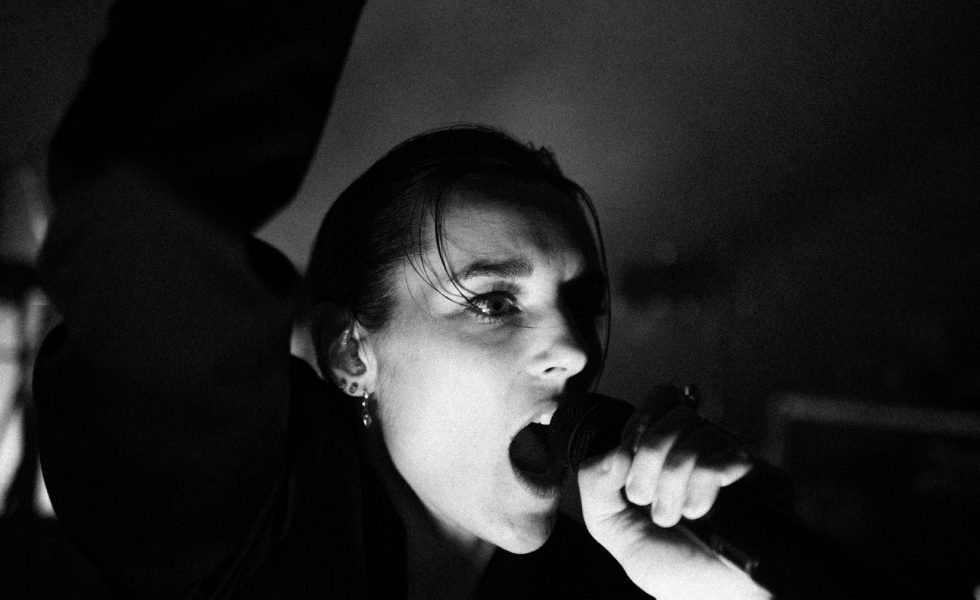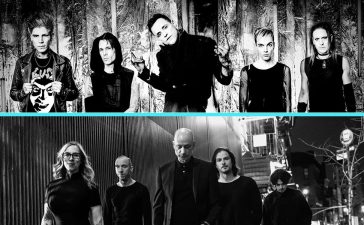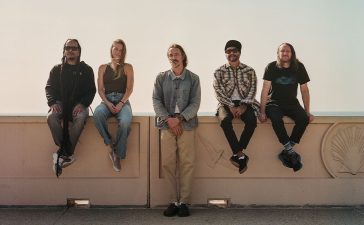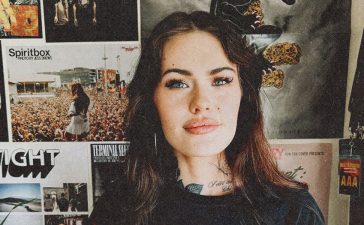To Love Is To Live, the new solo vehicle for Savages frontwoman Jehnny Beth, drops at the same time as her book of erotic fiction and photography. Needless to say, the concepts of love, sex, freedom, what’s normal and what’s socially acceptable, gender and power have all informed both her album and her writing.
Teaming up with renowned producers Atticus Ross and Flood has forced her to change her approach from the grooves she’d worn with Savages. Their expertise in creating whole landscapes with synth-industrial tools for soundtracks and epic bands such as Nine Inch Nails and U2 has given To Live Is To Live a cinematic scope. It’s fitting for a woman with plenty of stories and the means to tell them.
Jehnny Beth left her home country of France for London when she was in her teens. Her parents, theatre directors both, encouraged Jehnny and her sister to pursue arts educations. Beth was learning to sing and play the piano at the age of 8, later performing her first piano recital at 10.
In 2006, she moved to London with Johnny Hostile (Nicolas Conge), her partner in John & Jehn. They would later join the founding members of Savages, Gemma Thompson and bassist Ayse Hassan in 2011. Their first album Silence Yourself (2013), ranked at 19 on the Official Albums Chart in the UK, and the following album, Adore Life in 2016, were both Mercury Prize nominated.
Beth has performed live guest acts with Anna Calvi, PJ Harvey and The xx. She’s collaborated with Bobby Gillespie of Primal Scream, Julian Casablancas of The Strokes, Gorillaz and Danish electronic act Trentemøller.
To Love Is To Live is a bold, multi-genre, raucous and exciting solo release. It is her first time collaborating with producers, a deliberate choice to differentiate her working methods from the Jehnny Beth who fronts Savages. Though Johnny Hostile is on production as ever, the additions of renowned studio producers and film soundtrack veterans Atticus Ross and Flood have introduced their signature synth-industrial sound.
“I’m a big Nine Inch Nails fan. Atticus Ross was the first producer I contacted for this record. Songs like ‘Flower’ were good as they were but I felt like Johnny and I needed the influences of other people. I wanted to change all the methods I had worked before, with Savages for instance. I wanted the record to be one where production is as important as the songs, like with Kendrick Lamar on To Pimp A Butterfly (2015) and Low on Double Negative (2018). Atticus had worked with Trent [Reznor] on film soundtracks and that was part of the appeal of working with him, finding a narrative and creating a sense of suspense. The album’s meant to sound like a journey, one where you get to the end and it makes sense to start again.”
Beth moved back to Paris three years ago to confront some of the personal issues she wanted to address in her 30s after living in London for so long.
“We need to break some of those systematic clichés about what it means to be in a couple or in a relationship. I like to play with those concepts and ask those questions.”
“I lived in London for 12 years. Johnny Hostile had moved to Paris before I decided to move back too, and acquired a studio here. After a decade of running away from my own country, I felt like I was ready to go home. All of my 20s was about finding my identity outside of who I was, outside of family and friends. For me, I’d given so much to Savages and that group effort, that I’d avoided facing personal issues I needed to solve. In Paris, I bought a flat here with the money I made from the radio show on Apple Music Beats 1, Start Making Sense. I live really near the studio. I cross the cemetery in Paris to get there from my apartment. It’s very calm, this part of Paris, there’s a lot of old people. I quite like it.”
A fundamental difference in the approach to making To Love Is To Live is the focus on making a record for its own sake, rather than as an album that acts as an entree to a tour. “I intentionally forgot about the live aspect,” she says. “With Savages, the stage was the starting point of everything. I always thought, ‘How will I perform that live?’ but with this record I wanted to think again and do things differently. I could do whatever I wanted. The live aspect then becomes a continuity of the record rather than central to it.”
Beth had a whole tour planned, including a tour alongside Nine Inch Nails in America. “I played at the BBC Central Court in March, so I played one show and I was really proud of the group we had together for the tour, including Johnny Hostile. We were doing Glastonbury, Pitchfork, everything. On the upside though, I think this might change the way we view records. It might make record companies see that an album needs a year before a tour happens. Records used to be released and then the tour happened a year later. It gave people a year to really discover a record.”
Beth’s book is called C.A.L.M: Crimes Against Love Memories. “It’s six monologues and six dialogues,” she explains. “The subjects are intimacy and freedom. It all started for me because I felt fed up with writing lyrics and I couldn’t write any more lyrics. I needed more space to express myself and prose seemed like the best direction to go. When Johnny and I moved to Paris, Johnny took up photography and it felt like a liberation and an intimacy. We created a book that presents an alternative to monogamy, love, family and what is presented as the norm. It’s a book about fantasies. Fantasies to me are about dreams that can’t be judged, they must be free. Like in dreams, there’s moments of suspense, fear and desire.”
Beth has been candid on her album and in her book, but in a way that preserves distance and never reveals too much. Like the photos that Johnny Hostile has taken for her physical output, no faces are clear and while intimate ideas are thoroughly explored, identities are preserved. I cross the line towards the end of our interview and immediately sense I’ve asked the wrong question.
“Johnny and I are a couple and we have been for 15 years,” she says carefully. “Why are you asking?”
Purely curiosity, I respond. She takes a moment but then seems to shake off the wariness.
“I can talk about relationships and concepts of romanticism but I don’t want to discuss details of my personal life. I’m open to talking about any of those concepts. We need to break some of those systematic clichés about what it means to be in a couple or in a relationship. I like to play with those concepts and ask those questions.”
Love, sex, womanhood, freedom and normality are the universal questions we want artists to challenge us with, to provide us with a sense that our own contradictions and concerns are not ours alone. Beth’s work gives us permission to explore various aspects of our own psyche. Just don’t try to probe into hers, she’s got to preserve the mystery for a few more solo albums and books I suspect.






